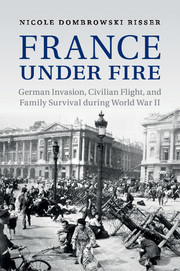Description
France under Fire
German Invasion, Civilian Flight and Family Survival during World War II
Studies in the Social and Cultural History of Modern Warfare Series
Author: Dombrowski Risser Nicole
A social, military and political history of the French refugee crisis tracing the impact of government responses upon civilian lives.
Language: English
Subject for France under Fire:
40.64 €
In Print (Delivery period: 14 days).
Add to cart
France under Fire
Publication date: 05-2015
Support: Print on demand
Publication date: 05-2015
Support: Print on demand
Approximative price 71.14 €
In Print (Delivery period: 14 days).
Add to cart
France under fire: german invasion, civilian flight and family survival during world war ii
Publication date: 07-2012
328 p. · 15.8x23.5 cm · Hardback
Publication date: 07-2012
328 p. · 15.8x23.5 cm · Hardback
Description
/li>Contents
/li>Biography
/li>
'We request an immediate favour of you, to build a shelter for us women and small children, because we have absolutely no place to take refuge and we are terrified!' This French mother's petition sent to her mayor on the eve of Germany's 1940 invasion of France reveals civilians' security concerns unleashed by the Blitzkrieg fighting tactics of World War II. Unprepared for air warfare's assault on civilian psyches, French planners were among the first in history to respond to civilian security challenges posed by aerial bombardment. France under Fire offers a social, political and military examination of the origins of the French refugee crisis of 1940, a mass displacement of eight million civilians fleeing German combatants. Scattered throughout a divided France, refugees turned to German Occupation officials and Vichy administrators for relief and repatriation. Their solutions raised questions about occupying powers' obligations to civilians and elicited new definitions of refugees' rights.
Introduction: no more 'behind the lines'; Part I. Civilians in the Line of Fire: 1. Securing the homeland; 2. Mothers move against military and bureaucratic entrenchment; 3. Pulling the plug on the city of lights; 4. Civilian survival on the open road; Part II. Refugees, Rights, and Return in a Divided Land: 5. Provincial towns feed and shelter refugees; 6. Paving the road for refugees' return; 7. German exclusions inaugurate a policy of ethnic cleansing; 8. Disappointment and despair in the occupied zone; Conclusion.
Nicole Dombrowski Risser is Associate Professor of History at Towson University in Maryland. She is editor of Women and War in the Twentieth Century: Enlisted With or Without Consent (1998).
© 2024 LAVOISIER S.A.S.




